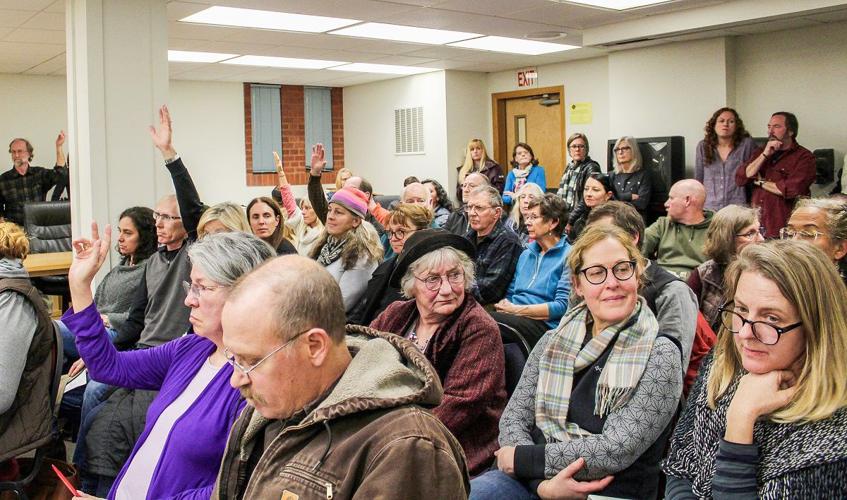The Hood River County Board of Commissioner’s meeting room was standing-room only Tuesday evening as residents gathered for a public hearing on the county’s ongoing effort to revise its Short Term Rental code.
An ordinance was ready for approval Tuesday night, but after hearing public testimony and staff comments, the board decided to continue the hearing to February in order to make some changes to the draft.
Instead of requiring any two of four documents to prove residency, the commission accepted staff’s recommendation to require applicants to submit either a federal or state tax return, as well as one of any of the three other forms of acceptable proof of residency: A driver’s license, Oregon voter’s registration, or a Hood River County ID card.
After some significant debate, the commission also requested a change to one section of the ordinance that prohibits alterations or expansions of an existing dwelling specifically to accommodate its use as a rental. The commission requested it changed to state that if a property owner does alter or expand their home, they have to get their STR permit modified.
County staff was first charged with creating a legislative amendment to STR regulations after a public hearing on the issue back in August. Since then, county staff has worked with the board of commissioners to draft an official ordinance around these changes to the existing code:
Official notices were sent out to all potentially affected property owners in December, inviting them to submit official written comment or to appear before the commission during the Jan. 22 public hearing to comment in-person.
“Most of the comments received relate to certain parts of the code rather than general support or opposition,” said Eric Walker, principal planner and Community Development’s interim director, to the commission at the start of the Jan. 22 public hearing.
Many of the comments were associated with Thrive Hood River, formerly known as the Hood River Valley Residents Committee, a local group that has long supported stronger STR regulations in Hood River County.
“We are heartened by the sincere efforts the county has made and are in overall support of the changes to the ordinance,” said Thrive President Dale Hill at Tuesday’s meeting, adding that they still had some concerns with the ordinance: Namely, that it requires neighbors with a complaint to take that complaint directly to the property owner before going to the county, a requirement that could create unnecessary tension, he said; and that some of the language is either unclear or too flexible in execution. “We thank you for your efforts and support the changes with consideration to these adjustments,” Hill said.
Lisa Coswell, a local STR operator, later testified that she wants to keep the opportunity to remedy complaints with her neighbors. “It is un-neighborly to go directly to the county,” she said.
The county ultimately agreed to keep the existing language.
A large part of the public testimony came from current STR operators on EFU land explaining the difficulty of their situations and the necessity of using their STR to supplement their income due to high land prices.
One such testimony came from Mary Zenorini, who said that she and her husband live on an EFU-zoned property that’s unfarmable. Back in 2004, she said, they received approval to build an accessory dwelling next to their residence to accommodate Zenorini's parents and, after they passed, the Zenorinis tried to get permits to rent that dwelling out as an STR or a Bed and Breakfast but were denied both.
“We’re feeling a bit tense about some of those things (in the ordinance) because we’ve been told we can’t use it (the dwelling) for anything but storage, even though we were required to build it to county code,” Zenorini said.
Another came from Mario and Kira Guisto, a couple operating a farm on EFU land. “I recently bought property in the valley four years ago, my wife and I saved up for it for 10 years … Can we make it right now? Yes. Am I going to pay stuff off right now? No, it’s going to take my entire life,” said Mario at Tuesday’s meeting after his wife, Kira, asked the board to “consider young farmers trying to make ends meet” when drafting the ordinance.
“Renting out our house as a Short Term Rental is a good alternative to supplement out income because at these rates, you can’t make it just farming,” she said.
Walker clarified that, in the current proposal, STRs are allowed on EFU property if the property isn’t receiving farm or forest tax referral, but the application goes through a more arduous process.
The board agreed to keep the existing language regarding STR regulations on EFU land.
County staff will bring the updated ordinance to the commission’s February 19 meeting to do another first reading, after which time another public hearing can be scheduled.



















Commented